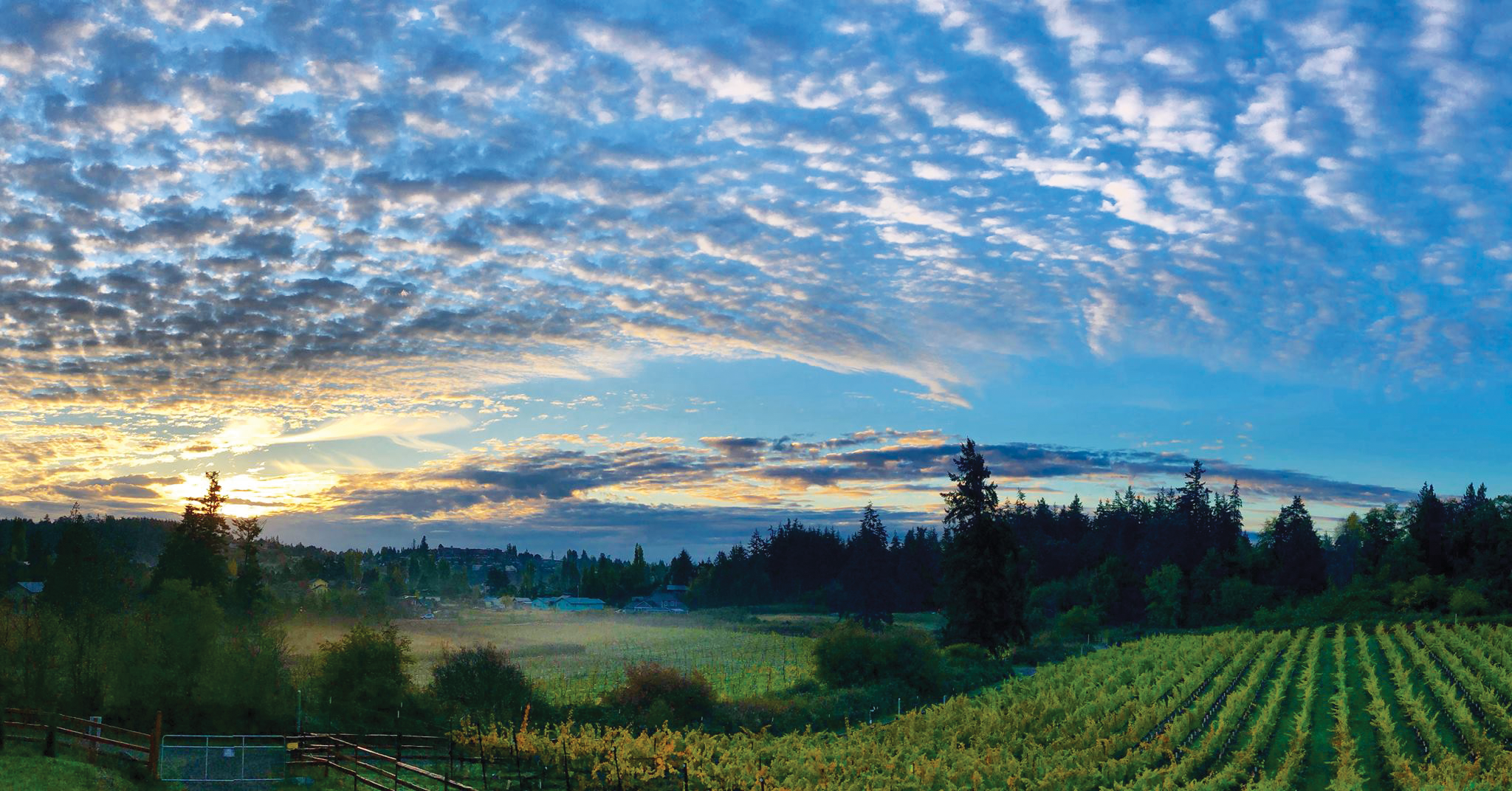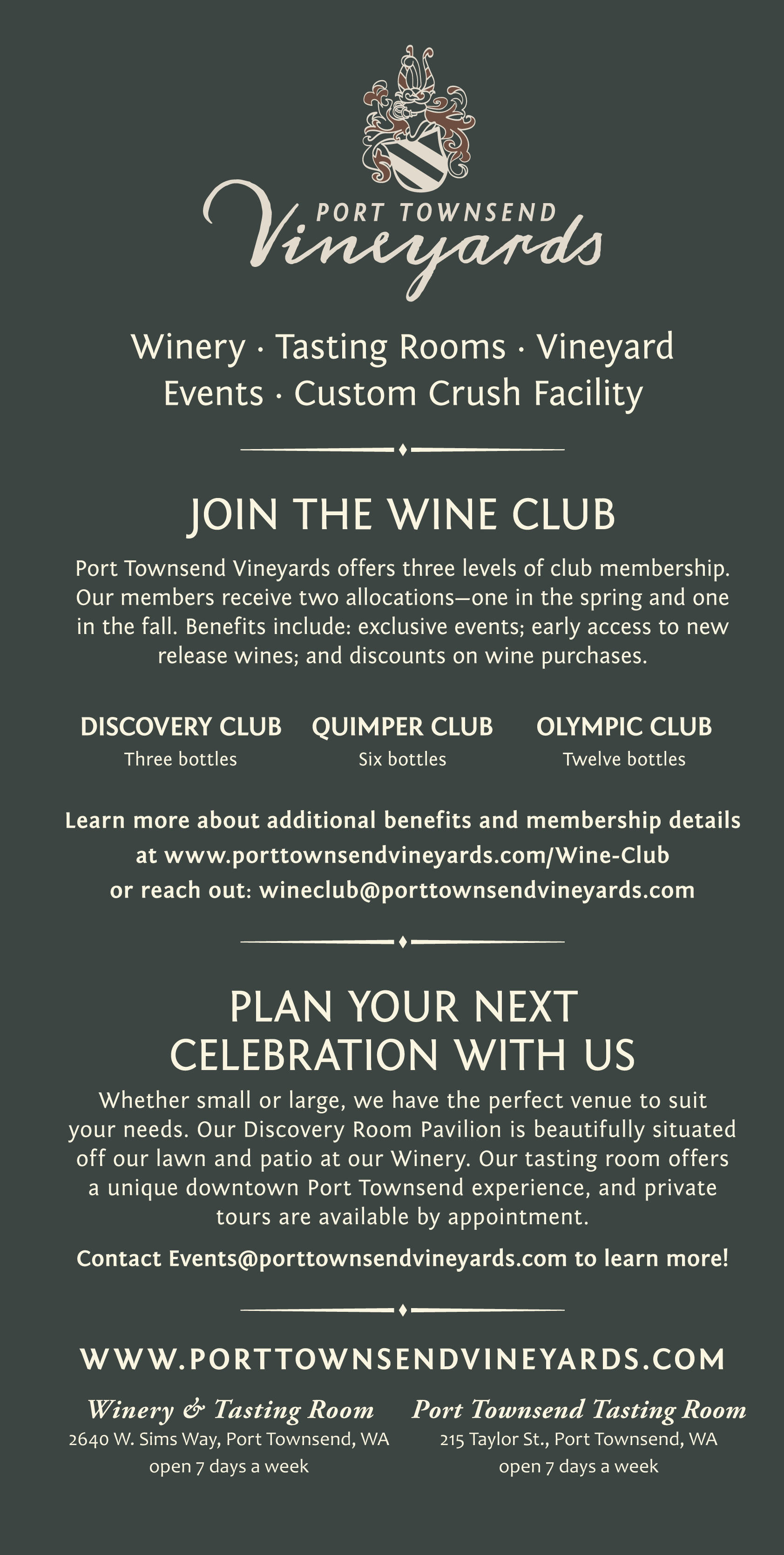Port Townsend Vineyards
Siegerrebe - old vines in new terroir
If you thought Gewürztraminer was a mouthful, wait until you try Siegerrebe! Bred in Germany from a cross of Gewürztraminer (ga-VERTZ-trahmee-ner) and adeleine Angevine grapes, Siegerrebe (zee-gar-RAY-beh) is an old-world grape that results in an aromatic white wine akin to a classic Riesling.
What’s new is that it’s being successfully grown on Washington’s Olympic Peninsula, an area long thought to be inhospitable to wine grapes.
Port Townsend Vineyards, located in the middle of the city whose name it bears, happens to be in a micro-climate well-suited for Siegerrebe. “It’s the perfect climate here, and a beautiful grape on the vine,” says winemaker Ben Thomas. “It’s mauve in color. Exciting. The Puget Sound AVA is perfect for ripening these grapes.”
Siegerrebe
Siegerrebe is the largest producer of 10 varieties growing at the vineyard. Pinot Noir is second. Madeleine Angevine and Gewürztraminer aren’t far behind. While the proper climate is essential in growing grapes, so are the farming methods. Port Townsend Vineyards, one of the largest in Puget Sound, uses biodynamics and organic methods.
For example, they use dry farming techniques. Relying on natural water encourages vines to grow deep roots, which yields lower volume but higher quality grapes that contain more minerals and natural flavors. “The grapes are more pure and lighter; they represent the terroir, and it’s all about the dirt,” Thomas smiles. “Tilled into the soil to make it stronger every year, cover crops look nice and slow water runoff to help with erosion and leaching of natural nutrients,” Thomas explains.
The same crew that makes the wine, grows the grapes, which is unusual as most vineyards rely on traveling workers who may not be familiar with the vineyard’s biodynamic practices. All that work pays off. “We have to prune for next year’s crop,” he says. “Otherwise, the vines would take over and we’re not here to grow leaves! We’re here for the fruit!”
Port Townsend Vineyards’ estate bottled Siegerrebe wins gold medal in international competition
Getting a gold medal is a thrill. Getting a gold with 2700 international entries is awesome. Getting a gold with your first case of estate bottled wine is a downright near-miracle, and in the case of Port Townsend Vineyards it took a huge leap of faith to accomplish. But it worked.
Their home-grown Siegerrebe has gold-medaled in the prestigious 2019 Sunset International Wine Competition where it also earned a hefty 92 rating.
“This competition drew top-level wines and hand-picked top-notch judges to create a sophisticated and enthusiastic wine experience that is considered to be the most prestigious in the United States. Wines judged here were considered to be a cut above the rest—simply put, the best of the best,” said Debra Del Fiorentina, CEO of Wine Competitions, the event coordinators.
This from a vineyard in Puget Sound AVA’s North Olympic Peninsula—a climate with cool summer days that were long thought to be inhospitable to grape growing. Now, though, the area has proven to be an excellent terroir for growing cool-climate wines such as the Siegerrebe.
Siegerrebe is the daughter of Alsace’s Gewurztraminer and Loire Valley’s Madeleine Angevine, and is ideally suited for late-season ripening on the vineyard’s site.
Port Townsend Vineyards is committed to natural practices in the vineyard and the winery. They farm according to organic rules, using no herbicides or synthetic fertilizers and use cover crops to protect and build the soil. At harvest, grapes are hand-picked by a crew that includes volunteers from the community. To enhance the character of the wine, they emphasize native yeast, skin contact and barrel fermentation, which produces a slight hint of Crème Brûlée along with the grape’s natural floral elegance.
Serve chilled, and you will enjoy a pleasing flavor you’ve never experienced before, says the winery’s brochure. Apparently, the Sunset judges did just that!
And they said it couldn’t be done.
The Wines!
Ah, yes, the wine! While the winery offers several varieties, Thomas is most excited about the Siegerrebe and other estate wines from grapes grown, picked and fermented in Port Townsend. “It’s cool to bottle our own wine,” he says. “Whatever we get is a mixture of what we grow, and that can’t be duplicated. Twenty-five percent of what we carry will be estate wine.”
The next project is sparkling wine. “We’ll have 2019 bottled estate bubbles,” Thomas promises with a grin. “Because of the terroir, all of our estate wines go well with local food. Our aromatic whites go especially well with seafood; light, not heavy.” He notes that the Siegerrebe is perfect to serve when chilled to under 50°.
Green Zone
Along with producing wine, Port Townsend Vineyards is committed to preserving open space in the city limits. “The vineyards are more than just for grape growing,” Thomas explains. “We have created a green zone for wildlife. And birds, like quail and hawks, that have proliferated despite being in an urban area. Also deer; but fences make good neighbors,” he laughs. “We envision a day that when people ask, ‘Where do you live?’ you will say, ‘By the vineyard.’ It will be a town landmark,” Thomas adds.
It already is. By appointment, guests are welcome to tour the vineyards, stroll through the wildflowers and rows of vines, and enjoy wine club dinners on warm summer evenings. They may even meet one of the resident Soay sheep on weed-patrol duty.
Port Townsend Vineyard’s Growlers & Kegs: Sip Sustainably
Fill, drink, rinse and repeat. There you have the essence of the growler.
What’s in a name? Back in the 1800s, when water could be “iffy” and brew was a staple on the dinner table, people went to the nearest pub and stocked up for the week. Carrying home the frothy liquid required a tin bucket with a lid to keep the stuff from sloshing out. The resulting CO2 build-up inside the bucket rumbled as it came through the lid and someone thought it sounded like a growl. That’s the most colorful story of how these ingenious containers got their name.
Over the years, growlers lost popularity as single-use containers replaced them. Now, a new generation of brew and wine lovers is embracing the vessels,
and the taps that refill them, as ecologically and environmentally friendly ways to enjoy their favorite beverage. The move to wine on tap and growlers
is growing. Texas was the first state to allow them, followed shortly by Washington. On the Olympic Peninsula, Port Townsend Vineyards leads the winery movement with their state of the art facility that uses old-world, Port Townsend Vineyard’s sustainable methods in growing and producing their wines.
The advantages of using growlers and taps for wine are huge:
• It’s green! It takes only 5% of the carbon emission necessary to use and rinse a growler than it does to create a bottle, so you save the planet the other 95%. And you can use them for any liquid. HINT: Rinse the growler as quickly as you can and don’t use soap!
• Every growler filled is a bottle and cork saved from our landfills.
• Growlers are refilled from reusable, sealed stainless-steel kegs that eliminate bottle oxidation so you get a fresh glass of wine with every pour: the last glass poured tastes as good as the first.
• A branded growler makes a great souvenir.
• And going to the winery for the refills from the tap is like going to the old general store where you can gather with your friends and neighbors. Port Townsend Vineyards is committed to the concept. ”The only way you can buy our table wine is in growlers,” explains Twozdai (pronounced Tuesday) Hulse, marketing coordinator. “Just as the old-world brewers and vintners in Italy did, we sell our everyday wines in growlers. Guest keep their bottles and refill them throughout the year. It goes along with our goal of being an eco-friendly community gathering place. Last year, we filled 4,275 growlers, saving thousands of bottles from our landfills and recycling centers,” she continues.
“So, when you’re on the tour and you come in for wine, ask for it in a growler!” she grins. Do that and you’ll help preserve the planet, enjoy good wine, and take home a great souvenir.
WINE ON TAP: WHY IT MATTERS
• It’s eco-friendly. Wine on tap is stored in long-lasting stainless- steel kegs, which saves on glass, corks, packaging and pallets.
• Kegged wine results in a 96% reduction of the carbon footprint from wine from a bottle, which means less deforestation and damage to the ozone layer of our planet.
• Each steel keg eliminates two full years’ worth of carbon emission from one car!
• Glass comprises 50 to 73% of a winery’s carbon footprint.
• Of the more than 300 million cases of wine sold in the US annually, hardly any of those 3,600,000,000 bottles are reused.
• With a low recycle rate of 33.2%, two out of every three bottles end up on the trash heap: that’s about 2,404,800,000 bottles.
• One glass bottle takes about 1 million years to decompose; it’s one of the longest-lasting of man-made materials.
Summer on the Wine Plaza
Port Townsend Vineyards’ Vintage Wine Bar & Plaza features a new tasting room with indoor and outdoor seating areas to create waterfront views for guests to sip and savor, indoors and out. Our food menu emphasizes seasonality and small plates that pair seamlessly with our selection of wines. It takes advantage of ingredients at their peak and our kitchen sources from local farms and vendors in the region.
Behind the scenes of each of the 19 venues on our tour, dedicated crafts people are working hard to produce ales, brews, ciders, meads, spirits and wines for you to enjoy.
They experiment with different ingredients, temperatures and method—all with just one goal: to create the ideal beverage for your taste.
Which results in scores of choices. So how does a person find that perfect beverage?
The tasting room!
From small and cozy to open and elegant, you’ll find the tasting rooms as varied as the beverages they serve.
All are unique
For example, Port Townsend Vineyards has two very different tasting rooms. The casually elegant winery at the entrance to town hosts guests in a tasting room that reflects the old-world charm of 140-year-old wood beams artfully blended with modern stainless steel and glass. An adjacent pavilion and outdoor patio provide upscale venues for events, dinner parties and local music.
By contrast, the Vintage Wine Bar and Plaza in the beautifully restored historic C. F. Clapp building located on the waterfront in the heart of downtown beckons passersby on their way to the Rose Theatre and the trendy boutiques and restaurants in Port Townsend’s historic district. Its unique mixture of ultra-modern and traditional design creates a stylish ambiance while paying homage to the building’s Victorian roots. Featuring a tasting room and a commercial kitchen, it is designed for wine tasting, dinners, cooking classes, music and entertainment, and other events that benefit the community. The beautifully landscaped outdoor plaza, adjacent to the beach, offers patrons seating around large gas fire tables and views of marine traffic on Port Townsend Bay.
Both offer a wide selection of wine.
With so many venues to try, one thing is certain. No matter where you stop on the tour, you are sure to find a favorite; new or old!
Enjoy our Wines 7 days a week!
Winery and Tasting Room
Winery, Tasting Room, Events, Custom Crush Facility
2640 W. Sims Way
Vintage Wine Bar & Plaza
In Historic Downtown, Wine Bar, Small Plates, Live Music, Event Space
725 Water Street


















